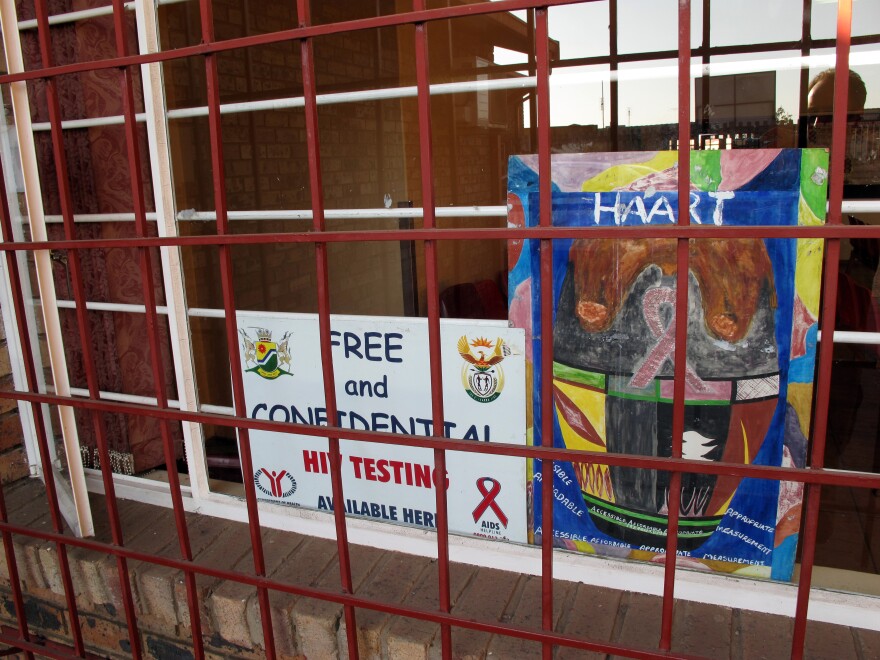South Africa has more people with HIV than any other country in the world.
Roughly 5.5 million of its 53 million citizens are infected with the virus. In some of the hardest hit parts of the country, one-third of women of childbearing age are HIV positive.
Now, after years of delay and mistakes, South Africa is transforming how it approaches the disease.

The South African government is simplifying AIDS care, cutting treatment costs and providing antiviral drugs to almost 2 million people every day.
The country just rolled out a new treatment regimen, which involves just one pill a day and costs less than $120 a year per person. By comparison, similar treatment in the U.S. costs thousands of dollars a year for each person.
Even AIDS activists, who continue to badger the South African Health Ministry, concede that the country is attacking the disease in new and innovative ways.
The delivery of antiviral drugs through the public health care system has been so successful and saved so many lives that the overall life expectancy in the country has increased by eight years since the crest of South Africa's AIDS crisis in the mid-2000s.
Nearly 350,000 South Africans died of AIDS in 2005. But in 2012, that number dropped by nearly half to about 190,000 deaths, the government reports.
At Johannesburg General Hospital, Dr. Francois Venter, who leads the infectious disease department, says South Africa is finally making significant progress against the AIDS epidemic.
"Just anecdotally, at my hospital 10 years ago, there were people dying on the floor," he says. "It was horrible. You'd step over bodies that you were looking after."

Venter credits the change in large part to the new health minister, Dr. Aaron Motsoaledi. He took over the position in 2009 as part of a Cabinet shuffle after President Thabo Mbeki was forced to resign.
A universal HIV treatment program could have been put in place years earlier, Venter says, if there had been the political will from Mbeki. "In my view, Mbeki and his Cabinet at the time were responsible for a minimum of 330,000 deaths and probably closer to half of a million, if they had had the energy we are seeing from the current government," he says.
Sibongile Tshabalala, 37, counts herself as one of the lives saved by the new HIV treatment program in South Africa.
She was diagnosed with HIV on Oct. 31, 2000. She recalls the exact date without any hesitation, as if it has been burned into the calendar in her mind.
"It was very hard for us back then," Tshabalala says. When you were diagnosed, it was like a death sentence, she says. You knew that you were going to die.
President Mbeki had been publicly questioning whether HIV causes AIDS. His government appeared in no rush to make antiretroviral drugs available, and his minister of health was touting garlic, beet root and lemon peel as a remedy.
When antiretroviral drugs were finally offered in South Africa's public health care system, they were hard to get and caused serious side effects.
Tshabalala says the first AIDS drugs that she took made her nauseous and caused several of her teeth to fall out. The newer medications are far easier to take, she says.
She has also benefited from a new government policy to make HIV services available at local health clinics.
Up until recently, she had to go to a hospital in Soweto to get her monthly prescription filled. Soweto is on the western side of Johannesburg, and Tshabalala lives on the far eastern extremities of the metropolitan area.
"I was waking up early in the morning at 5 o'clock to go there," she says. "I had to wake up early in the morning. By half past five, I must leave the house. By about 7 o'clock, I'd be at hospital."
Now Tshabalala can get her pills at a small clinic that is just a few minutes' walk from her home.
Under the policy, all routine HIV services, including testing and drug treatment, are offered at local health facilities. Nurses are able to prescribe AIDS drugs and even start patients on what will be lifelong treatments.
South Africa has tamed what used to be a terrifying disease, Tshabalala says. "Now people have a choice — to live or not to live," she says.
Copyright 2021 NPR. To see more, visit https://www.npr.org.







